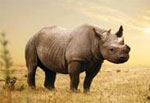The latest rhino poaching statistics released by the Department of Environmental Affairs is a cause of serious concern. Since the beginning of the year, South Africa has lost 455 rhinos due to illegal killings. WWF-South Africa says this means more rhinos have been killed in 2012, compared to the total number killed in 2011.
"Despite our predictions that South Africa would lose about 550 rhino this year, the most recent DEA figure is disappointing as last year's total has already been exceeded by mid-October. The Kruger National Park continues to be the hardest hit by poachers with 272 rhinos killed to date," says Dr. Jo Shaw, WWF-SA's Rhino co-ordinator.
Overall, the rate of arrests of those involved in rhino-related crimes across the country is higher in 2012 than 2010 or 2011. WWF-SA commends the South African government and law enforcement authorities for their continued efforts to help curb wildlife crimes, but believes there is no room for complacency.
World is watching SA
An example of this is the so-called 'Groenewald Gang' who are back in court on Friday, 19 October. This is one of the biggest local criminal syndicates allegedly involved in the illegal horn trade. "The world is watching to see that South Africa is prepared to prosecute rhino crimes to the fullest extent of the law and take these crimes seriously as an affront to South Africa's national heritage," Dr. Shaw adds.
In addition, one of the main conservation actions WWF-SA is using to help combat the rhino poaching challenge is ensuring existing rhino populations grow as quickly as possible. The WWF Black Rhino Range Expansion Project (BRREP) successfully translocated 13 animals to a new home in northern KwaZulu-Natal earlier this month. Since 2003, eight new black rhino populations have been created under BRREP and more than 40 calves have been born on project sites.
More born than dying
"To date, rhino numbers continue to grow in South Africa as more rhinos are being born than are dying, even when poaching mortalities are taken into account," says Dr. Shaw. "However, we are approaching the critical tipping point where rhino numbers go into decline and would undermine conservation efforts such as BRREP."
The illegal wildlife trade remains a serious international crime. "It is critical for the South African government to engage with consumer countries and to fight against international syndicates involved in illegal rhino horn trade. WWF-SA is concerned that the Memorandum of Understanding with Vietnam for collaborative action against illegal rhino horn trade remains unsigned. There is also an urgent need for law enforcement actions by neighbouring countries which are implicated as transit routes for illegal trade in rhino horn, specifically Mozambique," Dr. Shaw concludes.






























